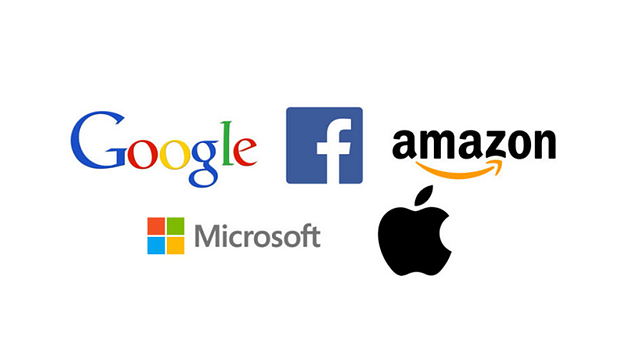Alphabet, Apple, Microsoft, and Facebook are Monopolies: So What?

The need to support a free market by breaking up large companies that stifle innovation and competition is well established, but is it still valid?
We’ve reached an economic precipice in building the future of technology; one that is striking chords of terror in many. Namely, that so much of our overall economic health is contingent on just a handful of technology companies. Consider that nearly 10 percent of the value of the entire US stock market is wrapped up in just 3 companies, Apple, Alphabet, and Microsoft; throw in Amazon and Facebook, for good measure, and you’re pushing 13 percent.
It should be no surprise that this has resulted in calls for their breakup. In a Salon interview, Jonathan Taplin, author of “Move Fast and Break Things: How Google, Facebook and Amazon Cornered Culture and Undermined Democracy, said,
“It’s almost a cliché to point this out, but if data is the ‘new oil’ then what’s the difference between Google and the ‘old oil’ of Rockefeller’s Standard Oil Company that was broken in 1905 by Teddy Roosevelt?”
In fact, if we wanted to extend Taplin’s analogy, we could go even further to point out that in the past these sorts of breakups actually created greater value than the companies they dismantled. In keeping with Taplin’s example, when Rockefeller’s Standard Oil was broken up the resulting component companies were far more successful and valuable!
An often told story is that Rockefeller was on the golf course on May 15th, 1911, when the Supreme Court ordered that Standard Oil be broken up into 34 companies. When he found out he turned to his golf partner and said “Buy Standard Oil.”
So, why not dismantle the tech giants before it’s too late? Because, there’s another side to this that’s worth considering.
The Two Sides Of A Monopoly
The economist Joseph Schumpeter, who introduced the theory of “creative destruction,” believed that monopolies can be healthy and actually stimulate innovation, since they foster a sort of complacency that opens the door to new players. After all, Google stepped into a market that should have been, by all rights, Microsoft’s. Years earlier Microsoft did the same to IBM with its MS-DOS operating system for PCs.
In a conversation I had with Peter Drucker in the late 1990s I asked him about Microsoft’s apparent monopolistic standing. At the time Apple was nowhere to be found, Microsoft was at its peak, and Google was just barely out of diapers.
Drucker’s take surprised me. I though for sure that he would say that there was no place for a monopoly in a free market. Instead he told me that many significantly disruptive technologies had to exist as “natural” monopolies for a period of time in order to justify both the investment needed to build out a new industry and to adequately control the vertical integration needed to build a complex product or service. It wasn’t clear, he told me, if Microsoft had reached that point yet.
I was reminded of Drucker’s advice in a recent Inc article I wrote about the AT&T TimeWarner merger. In that article I argued that the only way AT&T could possibly compete with Google et al would be through this sort of vertical merger and integration. To read that another way, I was saying that in today’s highly complex markets vertical integration is often necessity; even though vertical integration has been at the heart of many monopolies.
The Break Up That Never Was
Clearly, it’s not the first time we’ve been at this stage in the maturity of a new technology when it crosses the line from being a disruptor to being an essential part of the socioeconomic fabric of the world. One of the largest 20th Century examples is AT&T.
The break up of AT&T in 1984 into 7 companies was lunacy when you consider that over the past 30 years every one of those companies has merged with or been acquired by AT&T. Untold billions were spent in both the divestiture and subsequent reintegration of these companies; all to get back to where we started. Could you claim that innovation was accelerated as a result? Perhaps, but no more so than would have been the case if each was instead simply an operating unit of AT&T accounting for its own profit and loss. A better case can be made that the divestiture of AT&T actually put us decades behind in cellular communications because of the difficulty it created in unifying differing cell systems outside of tightly defined geographic markets.
In many ways I see the AT&T narrative as the watershed in rethinking attitudes towards what constitutes a true monopoly versus a well orchestrated ecosystem that happens to role-up to one set of financial statements. In the end the marketplace demanded that AT&T reconstitute itself from its pieces.
It would seem that we are (and have been for some time) applying old-school theories of how monopolies dissuade innovation, progress, and competition to a new framework where these rules may no longer apply, at least not in the same ways.
This Is No Commodity
Whether we think of data as the new oil or the Internet as the new railway, the temptation is to try and force fit today’s tech into the same model as the industrial age companies that antirust laws were intended to address. However, that only works when you are dealing with monopolies of commodities that are fundamentally undifferentiated, uncomplicated, and whose value chains are artificially held together by locking in partners, suppliers, and distributors.
However, data is NOT the new oil. Oil is a pure commodity. It just doesn’t matter who you buy it from. Any of Standard Oil’s 34 companies could have been swapped out with any other involved in a similar activity and the disruption would have been minimal. To say that you could do the same with Google, Calico, Chronicle, DeepMind, GV, CapitalG, X, Google Fiber, Jigsaw, Sidewalk Labs, Verily and Waymo is absurd. Each is wildly different and yet synergistically connected to the others.
In fact, the very structure of Alphabet is such that the individual companies are already acting as separate financial entities. And it’s a structure that may well portend of what tomorrow’s tech companies will all need to look like.
Within each of these operating companies there are also major products that could be argued to be near monopolies, such as Google’s YouTube. After all, YouTube is killing competition since Google gives it away, right? Wrong. Many providers such as Vimeo and DailyMotion have premium models that are doing very well.
So, where does all of this leave us? Are these monopolies? Do they squelch competition and create unfair pricing? Do they slow innovation? As Drucker would often say to me, “Perhaps those are the wrong questions.”
A better question might be, “Are the various technologies that these companies develop and deliver still at a stage where the complexity of their integration and the sophistication of their solutions can simply not exist outside of a tightly controlled and integrated set of capabilities? And is the overall climate for competition getting better or worse?”
The answer to that is fairly obvious to all but the most naive. The nature of the technologies that companies such as Alphabet, Apple, and Microsoft are creating requires a level of coordination at speed and at a scale that cannot be achieved otherwise; at least not yet. They are far from commodities. And they are incredibly important to the ongoing operation of our businesses and our society. And, in many ways, innovation and competition has never been more prolific. A new idea can be funded, developed, and delivered entirely by the crowd and in the cloud. Schumpeters’s creative destruction has never been more of a force.
This doesn’t mean that any company should get a pass on adhering to the basic precepts of competition and fair pricing that support a free market. True monopolies, those that undermine competition, inhibit innovation, and hold a marketplace hostage by stifling progress will never have a place in a thriving economy. Especially on a global stage in which new ideas can come from anywhere.
If you’re still thinking that the rules for what constitutes a monopoly havent; changed I’d strongly suggest you read Judge Leon’s opinion for the AT&T TimeWarner Case. Few judicial opinions are as scathing of the government’s misplaced use of the past to build the future.
The bottom line, as we stand on teh precipice of tomorrow, is that it’s time to reevaluate the way in which our laws support the sorts of business ecosystems that will deliver the rate of innovation and manage the complexity needed to build the future.
This article was originally published on Inc.
Wait! Before you go…
Choose how you want the latest innovation content delivered to you:
- Daily — RSS Feed — Email — Twitter — Facebook — Linkedin Today
- Weekly — Email Newsletter — Free Magazine — Linkedin Group
 Tom Koulopoulos is the author of 10 books and founder of the Delphi Group, a 25-year-old Boston-based think tank and a past Inc. 500 company that focuses on innovation and the future of business. He tweets from @tkspeaks.
Tom Koulopoulos is the author of 10 books and founder of the Delphi Group, a 25-year-old Boston-based think tank and a past Inc. 500 company that focuses on innovation and the future of business. He tweets from @tkspeaks.
NEVER MISS ANOTHER NEWSLETTER!
LATEST BLOGS
The Evil Downside of Gift Cards
This past holiday season I saw probably one too many articles trumpeting the value of gift cards to retailers and how they are a great thing for retailers. My skeptic side starts coming out as I see article after article appear, and I have to start asking “Is the increasing prevalence of gift cards as a holiday gift (primarily Christmas) a good thing for retailers?”
Read MoreWhy the iPhone will not succeed – Yet
The new Apple iPhone is set to launch on June 29, 2007 and the press and investors are making it a darling. Investors have run Apple’s stock price up from about $85 per share before its announcement to $125 per share recently, but the iPhone still will not succeed – at least not yet.
Read More



